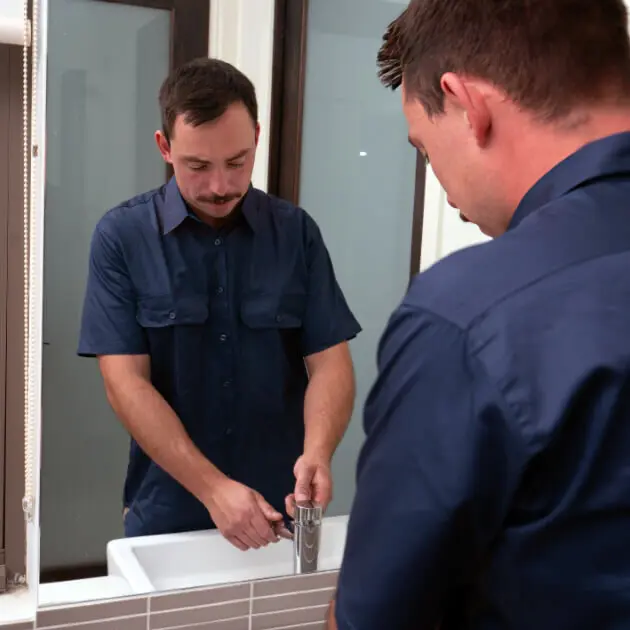How to Manage Your Bathroom Plumbing: Essential Tips for New Homeowners
How to Manage Your Bathroom Plumbing: Essential Tips for New Homeowners
Blog Article
What are your opinions on General Plumbing Tips for New Homeowners?

For new property owners, understanding and maintaining washroom pipes can conserve both time and money by protecting against costly issues down the line. Here are some important shower room pipes ideas to aid you maintain every little thing running efficiently.
Familiarize Yourself with the Main Shut-Off Valve
Understanding where the primary water shut-off valve is located in your home is critical. This permits you to promptly switch off the water in case of significant leakages or throughout pipes emergency situations, stopping substantial water damages.
On A Regular Basis Check for Leakages
Little leaks can result in big problems. Regularly examine under sinks, around commodes, and near pipes components for any type of indications of leaks. Seek wetness, little drips, or rust. Catching and repairing leakages early can stop much more major damage and conserve water.
Do Not Neglect Slow Drains
If your sink or bath tub is draining pipes slowly, it's frequently a sign of an obstruction creating. Resolving this early can protect against a full obstruction. Use a bettor or a plumbing professional's serpent to clear out particles. Prevent using chemical drainpipe cleaners as they can damage your pipelines in time.
Know What Not to Flush
Toilets are not waste disposal unit. Prevent purging anything aside from toilet tissue and human waste. Items like wipes, womanly hygiene items, and cotton swabs need to be gotten rid of in the trash to stop blockages and sewage system backups.
Mount Strainers in Drains
Location filters in your sink and tub drains to capture hair and other debris before they enter your plumbing system. Cleaning the filters consistently will aid avoid buildup and keep water streaming openly.
Maintain Your Water Heater
Guarantee your water heater is readied to a suitable temperature level (commonly around 120 levels Fahrenheit) to prevent scalding and lower energy usage. Flush the tank every year to remove sediment build-up, which can reduce the effectiveness and life-span of your heater.
Update Your Fixtures
If your home has older fixtures, think about updating to more effective versions. Modern toilets, showerheads, and taps are made to use less water while supplying excellent pressure, which can substantially lower your water bill and environmental impact.
Beware with Do It Yourself Plumbing Repairs
While it's alluring to take care of all home repairs on your own, be cautious with pipes. Some problems could require expert know-how, specifically if they involve main water lines or sewer repair work. Employing a professional can sometimes be much more affordable than do it yourself, particularly if it stops more damages.
Prepare for Winter
Protect your pipelines from cold throughout winter by shielding pipes in unheated areas like cellars, attic rooms, and garages. Throughout severe chilly, allow cold water drip from taps offered by subjected pipelines to assist avoid freezing.
Schedule Regular Maintenance
Consider scheduling annual inspections with a licensed plumber. They can detect issues that you might miss out on, such as surprise leakages or deterioration on pipes and fixtures. Normal upkeep assists expand the life of your pipes system and can prevent emergencies.
Conclusion
Recognizing and maintaining your home's shower room plumbing can protect against lots of common concerns. By complying with these crucial tips, you can guarantee your shower room remains useful and effective, saving you money and time in the future.
Essential Plumbing Tips for Homeowners: Keep Your Pipes Flowing Smoothly
As a homeowner, understanding the basics of your plumbing system can save you time, money, and a lot of headaches. Plumbing issues can range from minor annoyances like dripping faucets to major problems like burst pipes that cause significant damage. This guide provides essential tips to help you maintain your plumbing system and tackle common issues.
Understanding Your Plumbing System
Supply System: Brings fresh water into your home from a municipal source or a well. Drain-Waste-Vent System: Removes wastewater and vents sewer gases outside. Fixtures and Appliances: Includes sinks, toilets, showers, dishwashers, and washing machines. Basic Maintenance Tips
Regular Inspections: Periodically check for leaks, corrosion, and other signs of wear and tear. Look under sinks, around toilets, and near water heaters. Know Your Main Shut-Off Valve: In case of a major leak, you’ll need to shut off the water quickly. Ensure everyone in your household knows where the main shut-off valve is located. Prevent Frozen Pipes: In cold climates, insulate exposed pipes and let faucets drip during extreme cold to prevent freezing. Use Strainers: Install strainers in sinks and tubs to catch hair, food particles, and other debris that can cause clogs. Common Plumbing Issues and Solutions
Clogged Drains:
Prevention: Avoid pouring grease down the drain and use drain screens to catch debris. DIY Fix: Use a plunger or a plumbing snake to clear minor clogs. For stubborn clogs, a mixture of baking soda and vinegar can sometimes help. Leaky Faucets:
Prevention: Replace washers and seals regularly. DIY Fix: Turn off the water supply, disassemble the faucet, and replace worn parts.

Request Estimate Report this page